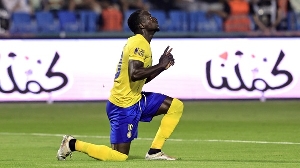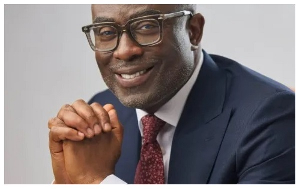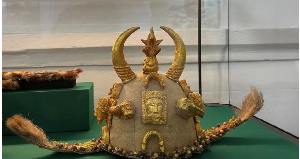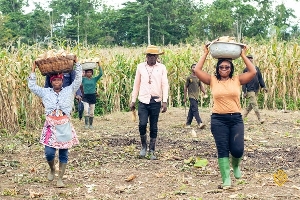Opinions of Sunday, 29 April 2007
Columnist: Okyere Bonna
Ghana @50: What Next? Matters Of Concern (part 2)
Now let us examine some tenets of Kennedy’s DREAM speech.
Ghana land tenure system
One area that calls for immediate plan and regulation is Ghana’s land tenure system. The Vice President Alhaji Aliu Mahama has described the prevailing land tenure system as problematic and an affront to the development objectives of Government and he has suggested the need for Ghana to streamline our land tenure system. Kennedy in his speech also argued for far-reaching reforms of our land management, acquisition and record-keeping and went further to elaborate on his plan.
According to Kennedy our land reform policy must have the following goals:
? Achieve the consolidation of the over 160 laws currently on the books into at most five laws.
? .Fulfill the payment of all outstanding compensation owed to traditional authorities/stools for lands acquired by government.
? Resolve all outstanding land cases, by employing processes with a strong component of arbitration within 12 months.
? .Establish an administrative body that will manage lands on behalf of traditional authorities and speed up the process of land acquisition while respecting the rights of traditional authorities.
? Abolish the distribution of land for residential purposes without the designation of space for schools, hospitals, police stations and parks for recreation.
According to Kennedy in his dream speech, he refuses to 1. focus only on our failures or look for scapegoats, 2. allow diseases that have been in retreat for decades to return with any vengeance, 3. depend on foreign nations and institutions, 4. lag countries like Singapore and Korea that have colonial histories like ours and, have resources far less than we have and 5. to focus on partisanship, ethnocentrism or insults
On the other hand, Kennedy believes his dream would engage government in policies leading to the following
1. Carry out a comprehensive reform of our constitution, laws and institutions that will make them more effective in serving the public.
2. Embark aggressively on wealth and job-creation.
3. Invest in our people who are the most critical resource in our development.
4. Improve the stewardship of our environment.
5. Create a significant attitudinal and cultural shift amongst all Ghanaians.
Constitutional Reforms
Kennedy advances reforms to1. Reduce corruption, enhance separation of powers and create transparency, to give ordinary citizens more voice in our governance.
2. Involve constitutional reforms that will streamline and strengthen all anti-corruption agencies, deepen decentralization through the election of DCE’S by district Assemblies, the direct election of mayors in the 5 largest metropolitan areas, increasing the DACF by 50% to 7.5%, giving the district assemblies more effective control of their resources and personnel and, end the requirement that the President appoint half of his Ministers from Parliament.
Job Creation
In embarking aggressively on wealth and job-creation, Kennedy believes the government ought to play a leading role in the supply of energy and good drinking water. He says
“We can never be a middle-income nation when so many of our citizens are unemployed or under-employed. In approaching job-creation, we must accept that for the most part, governments do not create jobs. Therefore, the role of government is to create the enabling conditions for job-creation.”
Kennedy argues that although government does not create jobs, there are key areas of the economy government must play a strong role, - like energy and water-supply. He went on to identify some enablers of job-creation as:
A. Public works; mainly, roads, energy, storage facilities etc
B. Human resource capacity building
C. Reduction of regulations and waiting time to establish business and simplification of banking procedures and fees.
D. Clarification and enforcement of laws with speedy resolution of disputes by commercial courts and respect for private property.
E. Opening of markets at home and abroad.
Agro Economy
Agriculture constitutes over 50% of Ghana’s economy. The truth is the governments of NDC and NPP over the last two decades have done a lot to improve Ghana’s agricultural industry but there still remains some work to be done. Kennedy in his dream speech contributes to the debate with comprehensive reforms. He proposes the following guidelines to revamp Ghana’s agricultural sector:- Construction of good roads and storage facilities and the provision of electricity under public works sector.
- Simplification of land acquisition under easing of regulatory burden
- Provision of credit for purchasing of inputs , land under simplification of banking
- Encouragement of agricultural science graduates to go into farming and the provision agricultural extension workers.
- Encouraging the formation of partnerships will also enhance the capacity of producers.
- Reviving the farms established through the “Workers brigade” and having private-government partnerships to manage them.
- Opening of markets abroad by teaming up with other third world nations to press for the removal of subsidies to western farmers will also go a long way towards improving agriculture. Of course, since charity begins at home, we must press the Africa Union and our ECOWAS neighbors to join us in opening markets right here on the continent. The lowering of trade barriers will involve the harmonization of customs regulations, axels and train gauges across the continent. We can begin that today because the imperialists have nothing to do with this.
Education, Health and Poverty Reduction
As a conduit of development, Kennedy argued for investing in the citizenry through education, health and anti-poverty spending. On education, Kennedy argues there should be universal and compulsory primary education, expanded opportunities for technical and science education and at the tertiary level more involvement by businesses in the Universities.On health Kennedy argues that we focus on the following:
• Sanitation: the doubling of toilets in schools, universities and places of business, cleaning of gutters, garbage collection and hand-washing done aggressively will give us a reputation for cleanliness and reduce significantly the burden of disease.
• De-worming
• Oral re-hydration
• Medication-impregnated mosquito-nets
• Public education to encourage hand-washing
• Retention of healthcare workers
Kennedy believes these measures will significantly reduce the burden of disease and suffering and increase our life-expectancy.
According to Kennedy we can never claim to be a modern nation when our residential areas are so haphazard, that they lack basic public amenities and or facilities; “Where is government when this clear manifestation of lawlessness and backwardness is going on?” (Kennedy). On anti-poverty-spending, Kennedy has urged that we borrow the “Progresso” model used successfully in Mexico as a model for improving the life of the poor.
Stewardship of our Environment
Like all over the globe, Ghana and sub-Saharan Africa are suffering a faster degradation of our environment. This calls for concern. On improving our environment, Kennedy raised concerns on land degradation, desertification, deforestation, loss of arable land, depletion of water and pollution and went on to suggest some policies to combat them.1. Combat deforestation by requiring logging companies and schools to plant trees.
2. Improve the proportion of citizens who have access to safe water and sanitation by a fifth in the next decade.
3. Plan our cities and towns by clearly identifying spaces for schools, hospitals, police stations and recreational parks.
4. Apply aggressive traffic laws to many vehicles on the road that will not meet even the most rudimentary of pollution standards. Protect citizens from such environmental hazards by enforcing anti-pollution laws
At this juncture, it may be pertinent to caution whoever wins the flagbearership of the NPP to involve Kennedy on a wider scale as he seems to have a plan and policy in place for (almost) every sector of the economy. By this I am not implying that Kennedy is not going to win the nomination however, I must admit that unless ideas really do matter now to the delegates it would be hard to predict any change in the status-quo. The good news however, is candidates like Nana Add can count on brains like Kennedy should the NPP follow suit from NDC in choosing a flag bearer.
Contrary to what Nana thinks, fortunately there are a lot of brains in Ghana to implement those policies if only Nana Addo’s government will seek them. As Kojo Albion would argue, all that Ghana needs to succeed are readily available in Ghana. One needs not look elsewhere. Kennedy has continuously proved to us over and over again that he is not just a Presidential material but one hungry and anxiously to help Ghana out of poverty by placing Ghana in the middle income bracket. I dare his critics to read his policies and vision for Ghana. On that note I urge Kennedy and his team to keep up the good work and pray that Ghana’s electorate would move from emotional politics to politics of reason and delivery.
God bless Ghana, lovers of true democracy and Kennedy campaign team. Thanks for dreaming for Ghana. We shall overcome eventually.













